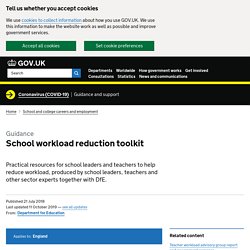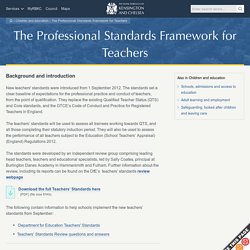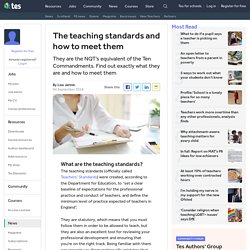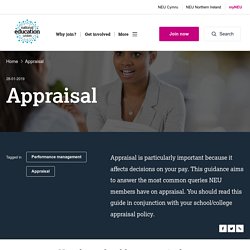

School workload reduction toolkit. How to use the toolkit The resources in this toolkit have been produced by school leaders, teachers and other sector experts in conjunction with the Department for Education (DfE), and have been tested with a range of schools across England.

You can use these resources to: identify workload issues in your school address workload issues in your school (such as feedback and marking) evaluate the impact of workload reduction measures. The Early Career Framework: Useful links. The Early Career Framework (ECF) sets out a two-year programme of support and development for new teachers after they complete initial teacher training.

The idea was first proposed in the DfE’s 2018 consultation on strengthening QTS and improving career progression. Subsequently, a group of experts was convened to advise on its development. The ECF was released in January 2019, and is available to new teachers in early roll-out regions from September 2020. EEF Implementation Guidance Report 2019. Teacher Wellbeing Index 2019. Teacher Standards Checklist by tree1568. Teacher's Standards & Evidence checklist by amy_31. The Professional Standards Framework for Teachers. Background and introduction New teachers' standards were introduced from 1 September 2012.

The standards set a clear baseline of expectations for the professional practice and conduct of teachers, from the point of qualification. They replace the existing Qualified Teacher Status (QTS) and Core standards, and the GTCE’s Code of Conduct and Practice for Registered Teachers in England. The teachers’ standards will be used to assess all trainees working towards QTS, and all those completing their statutory induction period.
They will also be used to assess the performance of all teachers subject to the Education (School Teachers’ Appraisal) (England) Regulations 2012. The standards were developed by an independent review group comprising leading head teachers, teachers and educational specialists, led by Sally Coates, principal at Burlington Danes Academy in Hammersmith and Fulham. Download the full Teachers’ Standards here [PDF] (file size 81Kb) Teachers standards 2012 one page compact easy print pdf by akilah123. Teaching standards: what are they and how do you meet them? What are the teaching standards?

The teaching standards (officially called Teachers’ Standards) were created, according to the Department for Education, to “set a clear baseline of expectations for the professional practice and conduct of teachers, and define the minimum level of practice expected of teachers in England”. They are statutory, which means that you must follow them in order to be allowed to teach, but they are also an excellent tool for reviewing your professional development and ensuring that you’re on the right track.
Being familiar with them can prevent you from making silly mistakes that could jeopardise your future as a teacher. Related: As an NQT, you must provide evidence that you are meeting these standards throughout the year to pass your induction. There are various templates for recording evidence for the standards available online, so you can find a way of keeping track that suits you. How do I achieve the teaching standards? Teachers' standards. Capability. Members of staff who underperform sometimes have a relatively short period of service.

However, a much larger proportion are experienced educators who are overloaded with work and/or face a plethora of new initiatives from local and central government. Members of staff who underperform may also be dealing with the effects of diminished health. That is not to say of course that everyone subject to capability proceedings is underperforming. Appraisal. How long should my appraisal period be?

If you are in regular employment your appraisal cycle should be 12 months. It should usually run from 1 September to 31 August, but your school’s policy should detail this. If you are on a fixed-term contract of between one term and one year then your appraisal period will match the length of your contract. I am starting a new job part-way through a cycle. How will my appraisal be affected? Meeting the DfE's pay and appraisal agenda - Standards Tracker. Addressing the teacher appraisal and pay agenda Educate’s advice and key references This document outlines our advice in relation to the DfE’s appraisal and pay agenda and is aimed at helping your school continue to improve.

Tip 1: Focus on teaching over time rather than overall lesson observation grades Schools are moving away from giving an overall grade for a lesson; preferring instead to give graded feedback on the quality of the individual components of professional practice seen – marking, differentiation, assessment, use of learning assistants etc. “Since 2009, inspectors have been instructed not to grade the overall quality of a lesson they visit. Teacher appraisal and capability: requirements. School teachers’ pay and conditions: guidance.
Teacher appraisal and capability: model policy. DfE to reduce data collection, and 6 more responses on workload. The government will tell local authorities not to ask for regular data updates from their schools in a pledge to reduce the burden on staff, as it accepts most recommendations from a new workload report.

However the Department for Education has stopped short of telling academy trusts not to ask for attainment data updates from all their schools, even when they’re not failing, as also recommended by the Making data work report published today. Education secretary Damian Hinds has also promised new guidance on teacher appraisals so they are not solely data-focused. We will support schools to cut out unnecessary work and help staff devote their energies to teaching Commissioned by Hinds earlier this year, the report from the workload advisory group led by UCL professor of education Becky Allen has also prompted the government and other organisations to write a letter to school leaders. Schools Week has the government’s responses to the report: 1. 2. 3. 4. 5. 6. 7.
5 Ideas for Making Data Collection Work. @TeacherToolkit In 2010, Ross Morrison McGill founded @TeacherToolkit from a simple Twitter account through which he rapidly became the 'most followed teacher on social media in the UK'.

In 2015, he was nominated as one of the '500 Most Influential People in Britain' by The Sunday... Read more about @TeacherToolkit What is your school doing to reduce the data burden? As part of my determination to better understand teacher-workload, I’ve revisited the Department for Education’s report on ‘Making Data Work’ chaired by Professor Becky Allen. The challenge With increasing growth and use of artificial intelligence, I can only see the issue of data collection in our schools becoming worse before it actually gets any easier – once we understand the benefits of using AI and what to do – with data.
What if your school collected less data, which in turn made the assessment which was actually collected, more meaningful? Making data work. This week saw the publication of the Making data work: Teacher workload advisory group report.

NAHT was involved on the advisory group report which outlines a number of suggestions to minimise and remove unnecessary workload associated with data management. Teacher workload advisory group report and government response. Skip to main content GOV.UK uses cookies which are essential for the site to work. We also use non-essential cookies to help us improve government digital services. Any data collected is anonymised.